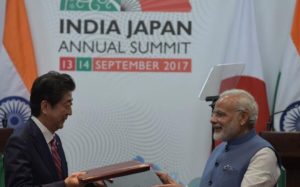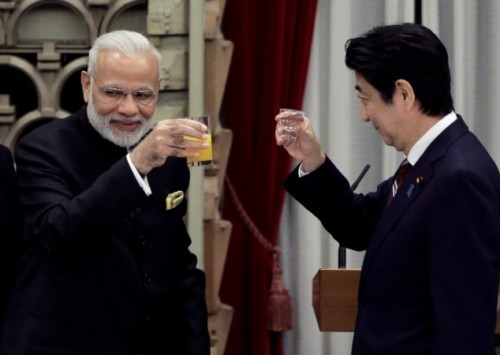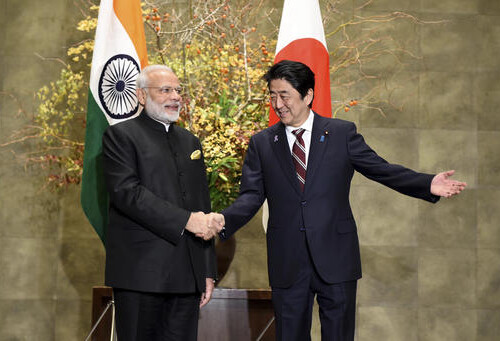Indo-Japanese relations turn a new page
Japanese Prime Minister Shinzo Abe’s two-day visit to India, focused on several agreements, bringing together the two countries in areas of defence, security and infrastructure among others.
Japanese Prime Minister Shinzo Abe visited Gujarat in western India for the inauguration of a high speed rail project as well as attend the two day 12th annual India-Japan visit. His visit was marked on the first day with a cultural experience and a roadshow of sorts where he visited heritage spots in India’s first UNESCO Heritage City, Ahmedabad. The second day of his visited focused on several tie-ups and signing of memorandums of understanding (MoUs), ranging on strategic, developmental and financial cooperation. India- Japan relations are being watched closely as several regional tensions have erupted in Asia.
Japan announced today that it will be setting up a Japan Promotion Board office in Gujarat, the home state of Indian Prime Minister Narendra Modi, as part of its efforts of investment in the state. Other areas that saw MoUs were skill development, several sports exchange agreements, civil aviation and connectivity schemes. Notably, the areas of naval cooperation as well as climate change were also discussed. “Indo-Japan ties are not limited to bilateral or regional spheres. We also have close cooperation on key global issues,” stated Modi. Signalling a rise in investment from the Japanese, Modi also shared, “In 2016-17 Japan invested USD 4.7 billion in India, which is 80 pc higher than last year.”
Abe also highlighted the cultural connect between the two countries, stating, “India has long been a familiar name to the Japanese people. Indian culture including yoga, cinema and cuisine is already extremely popular throughout Japan. From Buddhism to the concept of zero, the people of Japan have profound respect for India’s important contributions, its civilization and wisdom. Both countries enjoy warm public sentiments towards each other.”
The past few years have seen a visible growth in Indo-Japanese relations with special pacts such as the 2014 ‘Special Strategic Global Partnership’ being signed. Last year, India and Japan’s cooperation in nuclear energy was sealed in a deal that will see India gaining nuclear technology and fuel, among other things, in the decade to come. Besides several railway projects and urban transportation projects such as the New Delhi Metro, Japan’s contribution in the transportation sector will continue with the foundation stone of the bullet train and several other projects lined up. As IIM Bangalore also launched an India-Japan study centre to promote bilateral exchanges in the field of education today also marked signing agreements in the field of Japanese language education in India and joint research, among others.
Held very productive discussions with PM @AbeShinzo. We have covered vital ground during our talks today. pic.twitter.com/pGVmbveV9u
— Narendra Modi (@narendramodi) September 14, 2017
Asian alliance to look out for
Historically, ties between India and Japan go back a long way, but have been marked as increasingly friendly in the past decade. The major focus of bilateral relations between the two Asian countries has been cultural, economic and infrastructural ties. Cultural exchanges revolving around Buddhism and notable literary collaborations such as that of Nobel laureate Rabindranath Tagore marks the history of the two nations. India also plays host to factories of several Japanese car makers such as Toyota and Suzuki, the latter of which has partnered up with largest Indian car maker in the form of Maruti Suzuki. However, today’s statements at the summit by both the Indian and Japanese Prime Ministers have indicated that emergence as powers in Asia as well as a push for the region is on the priority of the current stage of friendship between the two partners.
As Abe’s two-day visit comes to an end, a highly public diplomatic meet between the two Asian countries at a time when Chinese aggression grows is being observed closely. Abe also expressed Japan’s support to India’s counter terror initiatives against groups belonging to countries like Pakistan. Both Modi and Abe today also condemned North Korea’s continuing assertion of its nuclear weapons and ballistic missile programs, and Abe signalled a “new era” for Indo-Japanese relations, which would bring “peace and prosperity in the Indo-Pacific and the world.”













